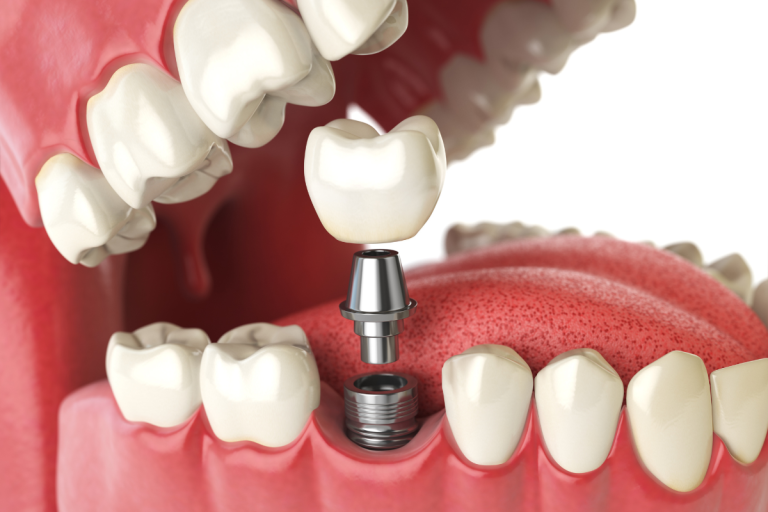Dental Implants: A Permanent Solution for Missing Teeth
Missing teeth can affect much more than just your smile. They impact your ability to chew properly, influence your speech, and may even lower your confidence in social and professional settings. While dentures and bridges have been traditional options for tooth replacement, modern dentistry offers a more advanced, long-term solution: dental implants.
Dental implants are designed to look, feel, and function just like natural teeth. With their proven durability and success rate, they have become one of the most recommended treatments for people seeking to restore their smile and oral health.
What Are Dental Implants?
Dental implants are artificial tooth roots made of biocompatible materials, typically titanium, which are surgically placed into the jawbone. Once the implant integrates with the bone—a process known as osseointegration—it acts as a strong foundation for a replacement tooth or crown.
Unlike removable dentures that sit on top of the gums, implants fuse with your jawbone, providing stability and preventing bone loss. They can replace a single tooth, multiple teeth, or even support full-arch restorations for patients missing all of their teeth.
Why Choose Dental Implants?A Natural Look and Feel
One of the biggest advantages of dental implants is how natural they appear. The crown placed on top of the implant is custom-made to match the color, shape, and size of your existing teeth. This creates a seamless appearance, allowing you to smile confidently without worrying about noticeable dental work.
Restored Functionality
Dental implants restore nearly 100% of your biting and chewing ability, unlike dentures that may slip or feel unstable. With implants, you can enjoy your favorite foods without discomfort or restriction.
Long-Term Durability
With proper care, dental implants can last decades—or even a lifetime. While other options like bridges or dentures may need replacement every few years, implants are designed as a permanent solution.
Prevention of Bone Loss
When a tooth is lost, the jawbone beneath it begins to deteriorate due to lack of stimulation. Dental implants mimic natural roots, stimulating the bone and preventing further resorption. This not only maintains your facial structure but also supports overall oral health.
Improved Oral Health
Unlike dental bridges that require neighboring teeth to be filed down, implants do not compromise surrounding teeth. In fact, they help maintain the integrity of your natural teeth and keep your bite aligned.
The Dental Implant Procedure
The process of getting dental implants typically involves several stages:
Initial Consultation
Your dentist will perform a thorough examination, including X-rays or 3D scans, to assess bone density and oral health. This step ensures you’re a good candidate for implants.
Implant Placement
During a minor surgical procedure, the implant is inserted into the jawbone under local anesthesia or sedation. Over the next few months, the implant integrates with the bone, forming a secure base.
Abutment and Crown Placement
Once healing is complete, an abutment (a small connector) is attached to the implant. Finally, a custom-made crown is placed on top, completing your new, fully functional tooth.
Who Is a Candidate for Dental Implants?
Most adults who have lost one or more teeth are candidates for dental implants, provided they have adequate bone density and healthy gums. Even if bone loss has occurred, procedures like bone grafting can often make implants possible.
People with chronic conditions such as uncontrolled diabetes or heavy smokers may require additional assessment, as healing may be slower in these cases. Your dentist will evaluate your overall health before recommending the procedure.
Caring for Dental Implants
Dental implants are easy to care for and don’t require special cleaning solutions like dentures. Daily brushing and flossing, along with regular dental checkups, are usually all that’s needed. With proper care, implants can last a lifetime, making them a worthwhile investment in your health and confidence.
Cost Considerations
While dental implants may have a higher upfront cost compared to dentures or bridges, they offer unmatched value over time. Since implants can last for decades without replacement, many patients find them more cost-effective in the long run. In addition, their benefits—such as bone preservation, natural appearance, and restored functionality—are priceless when it comes to quality of life.
Final Thoughts
Dental implants are more than just a cosmetic fix; they’re a comprehensive solution for restoring oral health, function, and confidence. Whether you’re missing one tooth or several, implants can provide a permanent, natural-looking replacement that improves your smile and your overall well-being.
If you’re considering tooth replacement, talk to your dentist about whether dental implants are the right option for you. With their durability, functionality, and ability to transform smiles, dental implants truly represent the gold standard in modern restorative dentistry.




